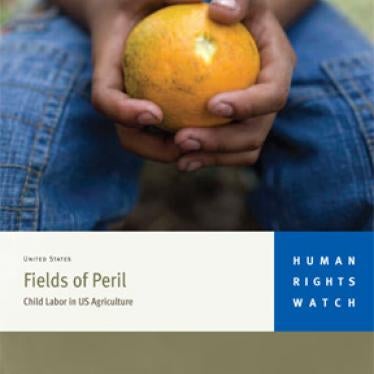Victor was only 11 when he went to work full time. At that age he could not legally work in an office or a store. Instead, he weeded, picked, and packed collards and kale on a Michigan farm.*
"I was a little kid," he told me. "I was used to playing with toys. They took me to their fields and I was like, ‘Where am I?'"
Although the legal age to work on this size of farm is 12, Victor's parents were deeply in debt and the farm's operator did not check his age.
The following year Victor was given a knife to cut greens. "Week after week I was cutting myself," he said.
"My hands have a lot of stories. There are scars all over." When I interviewed him last summer, Victor was 17 and had been promoted to driving a tractor, typically working from seven in the morning until eight at night.
Victor still turns over his check to his parents. "I can't afford to miss any day [of work]," he told me. "Half of my family depends on the money I earn. My money counts."
Right now, hundreds of thousands of children like Victor are working for hire on farms across the United States-weeding, detasseling, harvesting, and packing our fruits and vegetables, as well as tobacco, cotton, and other crops.
Most are Hispanic and most are poor.
Because of an exception in the federal child labor law, they can work for hire in agriculture at far younger ages, for far longer hours, and in far more hazardous conditions than other working children. In the last year, I've interviewed dozens of children who worked on farms in 14 states across the country. For too many, farmwork means an early end to childhood, long hours at exploitative wages, and risks to their health and sometimes their lives.
These children typically start at age 11 or 12 working ten or more hours a day during summers and weekends, and sometimes on school days. Many start earlier, though-I interviewed some as young as seven. Remarkably, federal law provides no minimum age for work on small farms with parental permission, and children ages 12 and up may work for hire on any sized farm. Outside of agriculture, children must be at least 14. Even then the jobs they can perform and their hours are tightly restricted.
The legal loophole for agriculture, which dates back to a more rural era, is particularly incongruous because farmwork is the most hazardous occupation open to children. Working with sharp tools and heavy machinery, being exposed to pesticides, climbing up tall ladders, lugging heavy buckets, children get hurt and sometimes die.
Under federal law, child farmworkers can do jobs at 16 that the U.S. Department of Labor deems "particularly hazardous" for children, such as driving a fork lift or operating a chainsaw, that no one under 18 can do anywhere else.
Young farmworkers drop out of school at four times the national rate, and for the 40 percent who are migrant workers, rates are probably higher. Victor doesn't get home to Texas until early November, missing several months of school each year. He was far behind in credits and didn't know if he would graduate.
Children who try to combine working and going to school often find that school pays the price, in part because, unlike all other jobs, there are no limits on how many hours children can work in agriculture outside of school hours. Without a diploma, child workers are left with few options besides a lifetime of farmwork and the poverty that accompanies it.
There is often considerable pressure on these children to work because their parents are overwhelmingly poor: total annual farmworker family income averaged less than $17,500 in 2005-2006.
The Labor Department enforces minimum wage laws poorly, and the law denies farmworkers overtime pay. They are often forced to spend their own money on tools, gloves, and drinking water that their employers should provide by law. They typically receive no paid sick or leave days, no health insurance, and have no job security. Victor told me that he and his relatives were seriously injured in a car accident the previous summer while being transported from one field to the next. The next day they returned to work to avoid missing a paycheck.
In addition to financial pressure, the fact that the work is legal presents it as a legitimate choice. But several mothers expressed regret. One said she had stolen her 11-year-old daughter's childhood.
It's time to eliminate the dangerous double standard for farmworker children and ensure that their work does not jeopardize their health, safety, and education. The Children's Act for Responsible Employment (CARE), H.R. 3564, pending in Congress, would set the same minimum age and maximum hour standards for children working for hire in agriculture that already apply to every other industry. Better enforcement of existing rules is also critical.
Even Victor would agree. His future children, he hopes, are "never going to set foot in the fields."
*Name has been changed to protect the individual's privacy.







